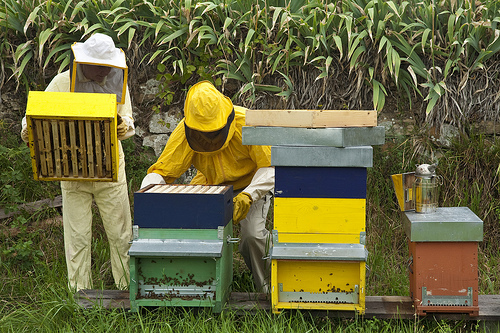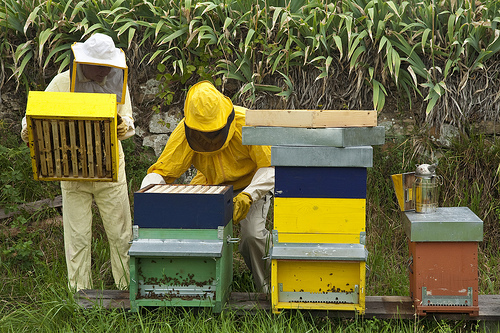 Dear Lou,
Dear Lou,
I heard a rumor that honey is toxic when placed in hot water. Is that true? Doesn’t the whole world drink honey in hot tea? Also wondering about the harvesting of honey — is it harmful to the bees and their sustainability?
Honey Lover from Vermont
Dearest Honey Lover from Vermont,
I didn’t find any convincing studies on the toxicity of honey in water, but I did find this most interesting quote through an Internet search on the topic:
According to ayurveda, honey shoud [sic] should never to be used heated directly or indirectly internally is it devolopes [sic] toxicity when heated, exept [sic] when performing basty (enema).
Who knew honey could be so versatile?
For a more credible answer to your question, I rang up Ross Conrad, a fellow Vermonter and author of Natural Beekeeping: Organic Approaches to Modern Apiculture. He said the suggestion that honey becomes toxic in hot water is really not accurate.
“The idea is that heat destroys enzymes. And basically any time you are going to heat honey the enzymes are going to get destroyed and as a result dilute a lot of the medicinal value of the honey. Raw and unfiltered honey has incredible antibacterial and antifungal properties. It’s very, very healing in many ways.”
That said, there’s no evidence that heat-treated honey is actually toxic.
As for whether the whole world drinks honey in hot tea, I have no idea, but it’s certainly my favorite sore throat soother: mix honey with lemon, herbal tea and a couple jiggers of whisky and you’ll soon swallow with ease. (If you want a “basty,” recipe you’re on your own).
Speaking of the whole world, you’ve probably heard that our honeybees are disappearing. Forget Halloween, this is scary, because without them humankind is in for a big basty. Honeybees act as pollinators for many agricultural crops and are necessary for all of us to have something to eat. But due to colony collapse disorder, our striped friends are dying. There are many factors that lead to colony collapse disorder, but pesticides and industrial chemicals are thought to be key players. Unsustainable beekeeping practices can also play a role, and this is where your final question comes in.
If honey harvesting isn’t done correctly, it can harm bees. Beekeeping, says Conrad, is like any other form of farming — some ways are more sustainable than others.
“People who are managing their bees in a natural, organic fashion are only going to take the excess honey that the bees collect,” he told me. Short of taking all of their honey and making survival impossible, there are other bad things beekeepers can do. “A non-sustainable way [to keep bees] would be to take too much and try to feed them back sugar or corn syrup.” One can only imagine what kind of effect HFCS or other substances might have on bees.
In addition to poor harvesting methods, there are other honey production practices to worry about. Some beekeepers treat their bees against mites with toxic chemicals and antibiotics on a regular basis. This adds to the pesticide load bees are already carrying. Last year, researchers were shocked by the pesticide levels found in hives.
While you’d think buying organic honey might be the answer, truly organic honey is a rare find. Conrad told me that while it’s not so difficult to manage hives organically, making organic honey is hard because bees can fly to non-organic places and pick up pesticides.
“The hard part is finding a location that is going to be four or five miles from any crops that are sprayed or grown with artificial fertilizers, chemicals, pesticides, fungicides or any of that,” he said. “That means five miles in any direction.”
For more information about organic honey, check out this rather skeptical article.
To find a beekeeper who is using best practices, buy your honey locally at a farmers market or a farm stand. Talk to your local beekeepers about how they manage their hives.
“Or get your own bees. That would be ideal. We need more beekeepers,” says Conrad.
If you want to spread a little kindness to bees, Conrad advises avoiding chemicals in your daily life as much as possible and grabbing your garden gloves. By removing the monoculture known as your lawn and making a nice habitat for wildflowers, you’ll provide fodder for lots of natural pollinators, not just bees.
For more information about supporting bees, check out this sweet, funny video of Grist’s own Umbra Fisk taking it to the streets for bees.
In sum: Cool your cuppa chamomile before adding honey; find a local beekeeper; and, finally, make life nice for some bees. Because with friends like us, they don’t need enemas.
Er, enemies.
Lou



